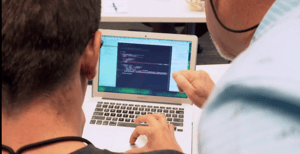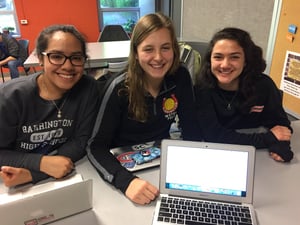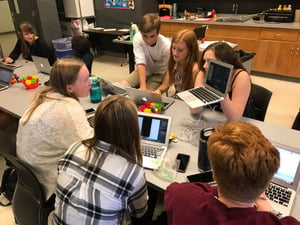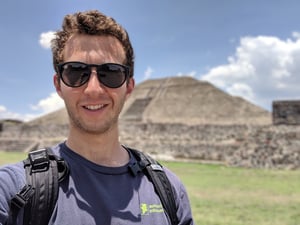‘I’m in software.’ ‘I’m a developer.’ We hear this from time to time from people around us, and you’d have to live under a rock to not know that tech skills are in demand. And, in education, we all know that career readiness is a top trending (and important) goal for students.
So, how do we help high school students connect school with very real career & tech opportunities? How can we expose them to the actual jobs that are out there, and get them both excited and on a path to getting there? Well, here’s one way...
Enter MobileMakersEdu
In a MobileMakersEdu (MME) high school course, students build working apps for Apple’s mobile devices using the language and tools of professionals – Swift and Xcode. Students experience an authentic workplace environment  right in the classroom, and are mentored, virtually, by real-world, professional developers who volunteer their time. These developers work for amazing companies, from all over the country and have job titles like Software Developer, Software Architect, Programmer. They offer students firsthand exposure to the tech industry, current tools and methodologies, and provide awesome networking connections.
right in the classroom, and are mentored, virtually, by real-world, professional developers who volunteer their time. These developers work for amazing companies, from all over the country and have job titles like Software Developer, Software Architect, Programmer. They offer students firsthand exposure to the tech industry, current tools and methodologies, and provide awesome networking connections.
We caught up with one of these volunteers, Michael Sacks. Michael is an iOS engineer in San Francisco at SoFi, a stock trading platform designed for young and novice traders. Michael has been a volunteer, as a weekly mentor to MME students, and served as a judge for the MobileMakersEdu ‘Build Your Own App’ Screencast Contest. We are so fortunate to have Michael as part of the MME community. Here’s a bit about Michael’s life as a developer/coder, why it’s important for students, and ... ethics ... yes ethics! Read on ...
Conversation with Michael Sacks, Mentor
The following conversation has been lightly edited for brevity, and originally appeared in this blog in October 2019.
How did you get into coding?
I took my first computer science (CS) class in high school, and one month in, I dropped the class - not for me. That was the beginning and end of it, I thought. But in college, I studied psychology, and I was interested in human behavior. Part of a project I was working on required data collection, so I made friends with computer science people to help out - and that was the new beginning, a new perspective for me. I ended up taking CS classes in college. I started in websites, then mobile apps since ‘these phones control our lives so I should control it'.
What do you like about your current job as a software engineer at SoFi?
I get to help people improve their financial situation, build a great (software) product, and impact many people.
 Why do you volunteer your time with MobileMakersEdu students?
Why do you volunteer your time with MobileMakersEdu students?
It can be really hard to learn to code. I like making it easier for anyone willing to put in the work. I think this class is a great starting place, I wish it was more widespread!
What has been the biggest surprise in your experience with the students?
They pick up concepts so fast!!
What skills, aside from coding, do you see students gaining from the MobileMakersEdu experience?
Time management, exposure to the professional world, and problem-solving.
Coming from the workplace, why are those skills important?
I think time management and problem-solving skills are more crucial to my .jpg?width=300&name=INCUBATOR%20(1%20of%2052).jpg) job than actually knowing how to code. Once you join the workforce, you find that everyone around you has the ability to get tasks done, but what sets you apart is your ability to manage time and solve problems.
job than actually knowing how to code. Once you join the workforce, you find that everyone around you has the ability to get tasks done, but what sets you apart is your ability to manage time and solve problems.
What’s the future of coding?
As software becomes even more ingrained in our lives, ethical and moral dilemmas will become more pressing. The barrier to entry (to learn to code) is lowering, and the ability to create and change software is becoming more accessible - which is all great. However, I hope that we become more critical of the software that we write, to be responsible citizens, and do more to leverage what I consider to be a very powerful tool.
Who should code?
 I believe that if you like any of the following, you would likely enjoy learning to code: cooking, legos, problem-solving, building things, or fixing things. The shortage of tech talent and software engineers is rooted in historically how and where these skills were taught (college). And that has produced a bottleneck. But now, there are so many ways to learn to code, and skills can be gained in high school, and in more non-traditional ways.
I believe that if you like any of the following, you would likely enjoy learning to code: cooking, legos, problem-solving, building things, or fixing things. The shortage of tech talent and software engineers is rooted in historically how and where these skills were taught (college). And that has produced a bottleneck. But now, there are so many ways to learn to code, and skills can be gained in high school, and in more non-traditional ways.
It can be hard at first, but people should try. Everyone should at least have the chance to learn to code.

